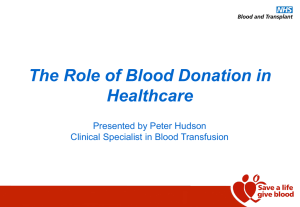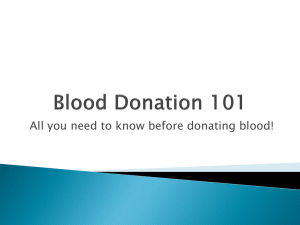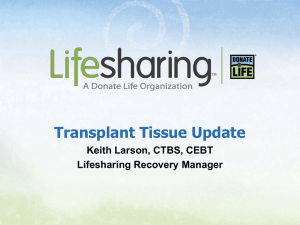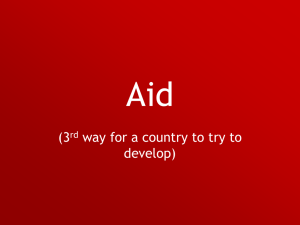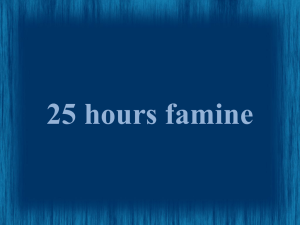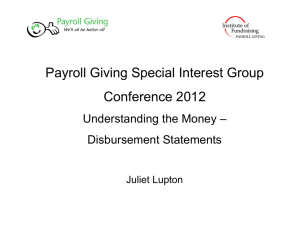Presentation
advertisement
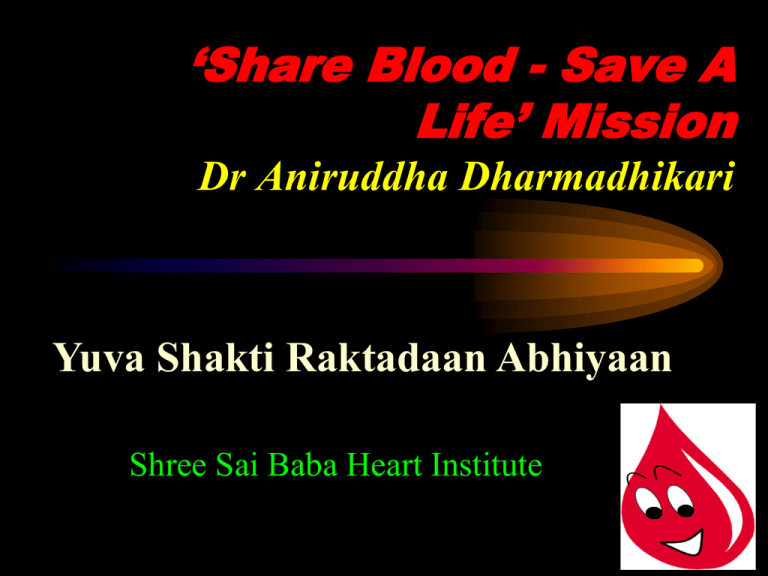
‘Share Blood - Save A Life’ Mission Dr Aniruddha Dharmadhikari Yuva Shakti Raktadaan Abhiyaan Shree Sai Baba Heart Institute What if? Imagine your father has just suffered a heart attack and requires blood transfusion to undergo open-heart surgery What if? Imagine your little nephew or niece baby was born with a blood disorder and required periodic blood transfusions in order to have a chance at survival. What if? Imagine your best friend has just met with an accident and requires at least 4-5 blood transfusions to compensate the blood loss ‘YOU’ - The Saviour! Naturally you'd want to do everything in your power to help. There is one way you can help. That is by Donating blood! Historical Aspects People have always been fascinated by blood Ancient Egyptians bathed in it. Aristocrats drank it. Authors & playrights used it as themes. Modern Humanity transfuses it. Historical aspects 1492 - Blood was taken from three young men & given to Pope Innocent VII to cure him. 1616 - William Harvey described how blood is circulated throughout the body. 1667 - First successful human blood transfusion. 1800 - Blood transfunsions banned bcos few people survived Why did success elude experimenters so long ? Clotting was the principle obstacle to overcome • Braxton Hicks 1869 – Sodium Phosphate as a nontoxic anticoagulant. • Karl Landsteiner 1901 – ABO blood gr. System. • World War II - establishment of blood banks by the American Red Cross in 1947. Did You Know? • Blood flows everywhere through the human body • We cannot live without it. • The heart pumps blood to all our body cells. Red blood cells carry oxygen White blood cells fight infection Platelets stop bleeding Plasma carries nutrition to cells Did You Know? 350ml of blood can save as many as three lives. Every second, someone in India needs blood. One out of every three of us will need blood in our life time. Only 3% of the eligible population donates blood in any given year. Even with all of today’s technology, there is no substitute for blood. Someone has to give blood in order for someone to receive blood. Do you know that.. Hospitals predict that the need for blood will increase 5% each year. Approximately only 4% of the eligible population in India donates blood. 75% of donors donate only ONCE per year If they donated just two times per year there would never be any shortages. Do you know that.. A 70 kg person has 5 litres of blood in his/her body (70 ml/kg). A person can donate blood every 90 days (3 months). Body recovers the Blood very quickly: Blood plasma volume– within 24 - 48 hours Red Blood Cells – in about 3 weeks Platelets & White Blood Cells – within minutes Do you know that.. 3 out of 10 patients who need blood do not get it because there is not enough supply Blood from a paid donor is 3 times more likely to have any 4 transmissible diseases such as malaria, syphilis, hepatitis B or C, or AIDS Some Reasons to Donate Blood Blood is always needed for: accident victims cancer patients blood disorder patients surgery patients Pre-mature, pre term babies and many others……. 1 out of 10 hospital patients needs a blood transfusion 4.5 million Indians lives are saved by blood transfusions each year WHOLE BLOOD Effects: 1 unit of whole blood (350ml) – ↑ Hb by about 0.75 gm/dl. In pediatric patients, 8ml/kg of W.B. – ↑ Hb by about 1 gm/dl. Our Primary Concern • Safety of Blood Donor & Blood Recipient (patient) because “Safe Blood” gives life, “Unsafe blood” gives infections • To ensure “Blood Safety”, – Strict “Donor Screening” at the Camp – “Testing” of collected blood to WHO specified standards – Strict “cross-matching” of blood samples to ensure safe transfusion to patient Pre-Donation information • Blood is taken ONLY from Voluntary Donors • Using sterile, disposable blood bags & instruments • Donated Blood is tested and separated into components benefiting 3-4 patients • It is safe to donate every 3 months • It is quick and safe. • It doesn’t hurt. • It saves 3 to 4 lives. Procedure for Voluntary Blood Donation Pre-Donation: 1. 2. 3. 4. Donor Screening Donor Eligibility criteria Deferral Criteria (Donor Consent Form) Medical examination Blood Donation: 5. Blood donation procedure Post donation 6. 7. Rest, advice & refreshment Donor Certificate, Donor ID card 1. Donor Screening • Safe Donor selection involves – 1. 2. 3. 4. • Identification of low risk populations Donor education and recruitment Encouraging self deferral based on “Deferral Criteria” Medical Examination before donation Voluntary Non-remunerated Repeat Donor (VNRD) is safest 2. Donor Eligibility Criteria • Who can donate? • Age: 18 - 60 years • Weight: > 45 kgs Wt > 45 Kg • Hemoglobin level: >12 gms/dl • Body temperature not more than 37◦C • Pulse regular, rate between 60-100/min • BP between 90-160 systolic and 60-100 diastolic • Not taking medicines for HT, DM, IHD 3. Deferral Criteria Who CANNOT donate? Life long х Abnormal bleeding disorder х Heart, Kidney, Liver Disorder х Thyroid disorder х Epilepsy, Mental disorders х Tuberculosis, Leprosy, х Asthma х Cancer х х Insulin dependent diabetics Uncontrolled High BP 1 year 6 Months o Surgery o Tattoo or body piercing o Typhoid o Dental extraction o Dog bite o Root canal treatment o Unexplained wt loss o Malaria o Continuous low grade fever o Vaccination 3. Deferral Criteria… (Donor Consent Form) Female donors cannot donate blood…… • During pregnancy • After delivery for one year • When lactating • During menstrual period and for 7 days therafter Male donors cannot donate blood…… • If cosumed alcohol in the previous 24 hours 4. Medical Examination at camp • Blood test for: – Blood grouping – Hemoglobin • Blood pressure • Pulse • General physical examination Post Donation Advice • Drink lots of fluids for next 24 hours • Avoid smoking for one hour & alcohol till after a meal • Don’t use elevator to go up immediately after donation as it will make blood rush to your feet & make you dizzy! • Avoid highly strenuous exercises & games for a day • If you feel dizzy, lie down & put your feet up. You will be alright in 10-20 mins. • Remove band-aid after 4 hours. • If you have any questions, meet camp doctor or call us at 91-253-2507001/ 2507002 6. Testing at Blood Bank Transfusion Transmissible Infections (TTIs) Blood collected at the BDC is screened using highest quality screening tests for 6 TTIs • HIV 1 • HIV 2 • Hepatitis B • Hepatitis C • VDRL (syphilis) • Malaria 7. Blood Products/Components & their uses Blood collected is screened for TTIs (infections) & IF SAFE, is separated into components & stored for issue A.) Whole blood – For Exchange Transfusion in Babies – Accident Victims – Complicated Delivery cases – Some specific surgeries 7. Blood Products/Components & their uses B.) Blood Components Red Cells: for anemia Fresh Frozen Plasma: for clotting disorders, burns Platelets/Platelet rich plasma: for cancer, dengue Cryoprecipitate: for clotting disorders Cryo-Poor Plasma: for burns What can YOU do? • Make Blood Donation a HABIT • Donate regularly – every 3 months to commemorate special days like birthdays, anniversaries …. • Motivate others to donate • Refer your friends and relatives Benefits to Donor of blood donation Health benefits: Regular donation (2-3 times a year….) – Lowers cholesterol – Decreases incidence of heart attacks, strokes Donor is also eligible to receive one FREE unit of blood if needed for – Self – Spouse/ Child/ Parents, and – Even friends Benefits to Donor of blood donation Research published in 2012 demonstrated that repeated blood donation is effective in reducing Blood pressure, Blood glucose, HbA1c, Low-density lipoprotein/high-density lipoprotein ratio, and Heart rate. Benefits to Donor of blood donation The first and foremost advantage of donating blood is the exalted feeling of saving someone's life Reduce the chance of heart diseases Increase in blood iron level increases the chance of heart disease. Increases blood iron level favors the process of cholesterol oxidation and thus leads to heart disease. Regular blood donation helps especially males in loosing iron on regular basis. It helps in reducing the chance of heart attack to one third. Enhance the production of new Red Blood Cells As the blood is withdrawn from the donors body there is decrease in blood cells. To replenish it, immediately new cells are produced by marrow and this way blood gets refreshed. Therefore donating blood helps in stimulating generation of new blood cells. Helps in fighting Hemochromatosis Hemochromatosis is a iron overload disorder wherein iron accumulates in the body tissue because or improper iron metabolism. This condition may lead to organ damage. People with little iron overload can easily donate blood and reduce their iron content. Burns calories One can diet or remain fit by donating blood regularly. One pint of blood (350 ml) when donated burns 650 calories in donor’s body. Blood donation also sheds extra calories and reduces blood cholesterol level. Invigorated feeling in elderly people It has been mentioned in various sites though not proved that elderly people in good health have reported feeling invigorated or reenergized by giving blood on a regular basis. Basic tests are done A donor gets a mini health checkup done before donating blood Hematocrit i.e. Hb level test, Blood pressure is measured, Body weight is checked. After the blood is collected it is tested for 6 major diseases. Donor is immediately informed if any of these test found to be positive. Reduce Cancer Risk Homogeneous blood donation is correlated with lower risks of cancers. According to the Miller-Keystone Blood Center, including liver, lung, colon, stomach and throat cancers. Risk levels dropped is related to the frequency of blood donation. Disadvantages of blood donation There are no major disadvantages of donating blood, except that sometimes one may experience a drop in blood pressure due to hypovolemia (a state of reduced blood volume), which may necessitate cancellation of donation. Sometimes, one may also experience mild nausea or dizziness for a short while. Our Motto No One Should Die Without Blood. No One Should Die Without Blood Donation. Every blood donor is a hero!
